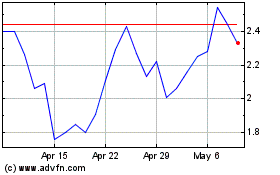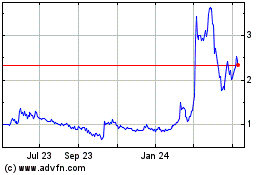BeyondSpring Presents Updated Efficacy Results from a Phase 2 IIT Study of Triple IO Combo of Pembrolizumab plus Plinabulin/Docetaxel in Metastatic NSCLC after Progressing on Prior Immune Checkpoint Inhibitors at the 39th SITC Annual Meeting
November 11 2024 - 8:00AM

BeyondSpring Inc. (NASDAQ: BYSI) (“BeyondSpring”
or the “Company”), a clinical-stage global biopharmaceutical
company developing innovative cancer therapies, today announced
that phase 2 IIT (Investigator-initiated) data on the first 30
patients dosed with plinabulin in the 303 Study of patients with
non-small cell lung cancer (NSCLC) after disease progression on
PD-1/PD-L1 inhibitors with and without chemotherapy were presented
at the 39th Society for Immunotherapy of Cancer's (SITC) Annual
Meeting on November 8th, 2024 in Houston, Texas.
Docetaxel remains the standard of care for patients with 2L/3L
NSCLC without targetable alterations who progress on immune
checkpoint inhibitors (ICI) with and without standard chemotherapy.
In the recent TROPION Lung-01 phase 3 studies, a similar patient
population had an overall response rate (ORR) of 12.8% and median
PFS (mPFS) of 3.7 months. In metastatic NSCLC resistant to previous
PD-1/L1 therapy1, PD-L1 and CTLA-4 inhibition alone or in
combination with hypofractionated radiotherapy produced limited
clinical benefits with ~11.5% ORR.
This investigator-initiated, single-arm, open-label, phase 2
study (KeyPelms-004 or 303 Study) evaluates the efficacy and safety
of a triple combination regimen of pembrolizumab plus
plinabulin/docetaxel (NCT05599789). The study intends to enroll a
total of 47 patients and is ongoing at Peking Union Medical College
Hospital, Beijing, China with the principal investigator Dr.
Mengzhao Wang, Chief of the Department of Respiratory and Critical
Care Medicine. Here, we report on updated results from 30
patients.
At the database lock on 29 August 2024, 36 patients were
enrolled, 30 exposed to the plinabulin regimen. Prior to entry, all
patients had experienced disease progression after initial clinical
benefit with ICI. Of the 30 treated patients (median age at 68.0
years; ranged 50-77 years), 73.3% were male and 26.7% were female;
60% were current or former smokers. Histology included 57% patients
(n=17) with non-squamous cell carcinoma and 43% (n=13) with
squamous cell carcinoma. The median follow-up was 11.5 months.
Below is an efficacy summary table:
|
Primary Endpoint |
Plinabulin + Pembrolizumab + Docetaxel (n=30) |
|
Confirmed ORR (RECIST 1.1) |
21.1% |
|
Secondary Endpoints |
|
|
Median PFS (RECIST 1.1) |
8.6 M |
|
Median OS (Overall Survival) |
Not reached |
|
Median DoR (Duration of Response) |
11.4 M |
|
Disease Control Rate(PR + SD > 4 months) |
89.3%(25/28 – 2 patients withdrew after first
dose) |
|
|
|
- The combination was generally well tolerated. 46.7% of patients
experienced grade 3 or higher treatment-related adverse effects.
Most common AE is myelosuppression (13.3%), GI side effect (13.3%),
and transient hypertension (6.7%). There were no treatment-related
deaths.
- Results are consistent with the data reported on the first 19
patients in Study 303 at ESMO in September.
“Plinabulin is a potent inducer of dendritic cell or DC
maturation that leads to T cell activation. DCs are the most potent
antigen presenting cell (APC). This unique mechanism of action
reinforces anti-tumor immune response with the potential to
overcome acquired ICI resistance, which may derive from APC pathway
alteration or T cell exhaustion. Compared to historical controls of
3-4 months of median PFS2, the efficacy data with 30 patients
maintained a doubled median PFS at 8.6 months, coupled with an
impressive disease control rate of almost 90%, which continues to
be encouraging and clinically meaningful for this severe unmet
need,” said Dr. Mengzhao Wang, principal investigator at Peking
Union Medical College Hospital.
SITC 2024 Abstract Title: Phase 2 Study of
Pembrolizumab (pemb) plus Plinabulin (plin) and Docetaxel
(doc) for Metastatic NSCLC after Failure on First-line Immune
Checkpoint Inhibitor Alone or Combination Therapy: Updated Efficacy
and Safety Results on Immune Re-sensitization
- Presenting Author: Dr. Yan Xu, Peking Union
Medical College Hospital
- Abstract Number: 1491
References:
- Schoenfeld et al. 2022, Lancet Oncology 23:279-291
- Ahn et al. 2024, TROPION Lung-01 Study, Journal of Clinical
Oncology, https://doi.org/10.1200/JCO-24-0154
About PlinabulinPlinabulin is a novel
first-in-class dendritic cell maturation therapeutic with durable
anti-cancer benefit observed across multiple clinical studies. As a
reversible binder at a distinct tubulin pocket, plinabulin does not
change tubulin dynamics or antagonize tubulin stabilizing agents,
such as docetaxel, which contributes to its differentiated activity
and tolerability compared to other tubulin binders. In addition,
plinabulin significantly reduces chemotherapy induced neutropenia
and could thereby increase docetaxel tolerability. Around 800
patients have been treated with plinabulin with good
tolerability.
About 303 Study303 Study is an open-label,
single-arm Phase 2 Study of Plinabulin plus docetaxel and
pembrolizumab for previously treated patients with metastatic NSCLC
and progressive disease after anti-PD-(L)1 inhibitor alone or in
combination with platinum-doublet chemotherapy. This study
evaluates the efficacy and safety of this triple combination
and is being conducted at Peking Union Medical College
Hospital, Beijing, China. The regimen includes Pembrolizumab 200 mg
IV every 3 weeks (Q3W) on Day 1, Docetaxel 75 mg/m2 IV Q3W on Day 1
and Plinabulin 30mg/m2 IV Q3W on Day 1 in a 21-day cycle. The
primary endpoint is investigator-based ORR (RECIST 1.1). The
secondary endpoints include PFS, OS, DoR, and safety. The study
intends to enroll 47 patients. The study is funded by Merck’s
Investigator Studies Program with provision of study drug and
financial support.
About BeyondSpringBeyondSpring is a global
clinical-stage biopharmaceutical company developing innovative
therapies to improve clinical outcomes for patients with high unmet
medical needs. The Company is advancing its first-in-class lead
asset, Plinabulin, a potent inducer of dendritic cell maturation,
in late-stage clinical development as a direct anti-cancer agent in
NSCLC and a variety of cancer indications. BeyondSpring’s pipeline
also includes three preclinical immuno-oncology assets.
Additionally, BeyondSpring is an equity owner of SEED Therapeutics,
Inc which is a pioneer in Target Protein Degradation technology and
its application in innovative drug development. Learn more by
visiting https://beyondspringpharma.com.
Investor Contact:IR@beyondspringpharma.com
Media Contact:PR@beyondspringpharma.com
BeyondSpring (NASDAQ:BYSI)
Historical Stock Chart
From Nov 2024 to Dec 2024

BeyondSpring (NASDAQ:BYSI)
Historical Stock Chart
From Dec 2023 to Dec 2024
